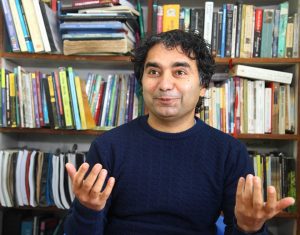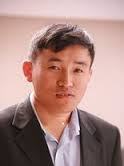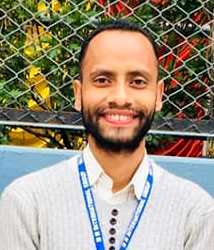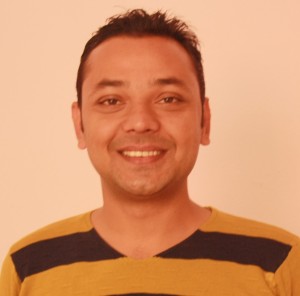On the occasion of our tenth anniversary, the Choutari editor, Jeevan Karki has collected the reflections from our founding/past editors and readers. Their reflections remind the readers the ups and downs in our journey, our contribution (contribution in education in general and ELT in particular), contents and readers perspectives on them, its sustainability, some valuable suggestions and most importantly its recognition around the world. It’s indeed very interesting to hear from them and we believe you will certainly enjoy these excerpts and know more about Choutari.

Think about its sustainability: Bal Ram Adhikari, Former editor
Contribution of Choutari
Choutari for a decade has been a good writing zone for professionals and writing enthusiasts. It has been supporting to promote writing habits. It has been a transition point for formal writing and highly academic writing, where writers can express themselves more casually. Moreover, it has also offered a platform for researchers to share their reflections. Interestingly, it is helping to review the teacher-student dichotomy. In the past, only teachers used to teach or write and students used to study or read but now students are also writing and teachers are able to read their students through the means like ELT Choutari.
Besides, Choutari is helping to generate the content on ELT and teaching-learning and education in general. The content published on Choutarih as been used in the course of B.Ed. third year in critical reading as well.
Contents of Choutari
It’s covering the ELT practices and experiences, ideas for professional development, and discourse on contemporary issues. This writing and discourse revolve around the ELT practitioners from Education faculty mostly. Therefore, now it should also cover and include the ELT practitioners from the stream of Humanities in order to back up and view the ELT practices using critical theories.
Sustainability of Choutari
It may be high sounding but Choutari should think about collecting advertisements from the nation and regional publishers. So that the fund could be utilized for the better design of the site, to conduct writing workshops, interaction, talks and also for some full-time editors/reviewers to value their time and effort. Likewise, it can also be used for paying for well-written articles, which could enhance the quality of writings on the magazine.
Likewise, it should also establish the direct connection with the graduate and postgraduate students through teachers to encourage, guide and mentor them in writing, like the way the theatres in Kathmandu do with the students in the university/campuses.

Choutari, the other child of our community: Shyam Sharma, founding editor
“Several of us NELTA members . . . would like to share with you a few materials related to ELT on a monthly basis,” said an email from Balkrishna Sharma, who signed the email along with Prem Phyak’s name and mine. “Our desire is to prompt some ongoing discussion on issues of interest in ELT,” he added, inviting ELT colleagues in Nepal to discuss, in NELTA’s Yahoo listserv, the texts and ideas we planned to share.
That was exactly ten years ago today. A child who was born a few months earlier just had a robust conversation with me about “social justice” as a theme that he looks for in movies that he considers worth watching.
An excerpt from Paulo Freiere’s Pedagogy of the Oppressed was one of the three items we had shared for discussion in that first “issue” of [N]ELT[A] Choutari (we were asked to stop using “NELTA,” the acronym of an organization we call our professional home, when its leadership wasn’t, for some time, driven by the positive energy that it used to be). I think that Choutari remains that free spirit, a monkey wrench in a hierarchical socio-epistemic culture.
For me, Choutari is a simple social phenomenon: an additional space born out of the need of younger educators, passed on and changed, and often almost gave up but never stopped using—just to make their voice heard as emerging, passionate scholars.
I’m sure that new generations of our language scholars will continue to use this platform, helping themselves and many more to pursue the profession.
As Bal said in his first announcement, “We wish you a pedagogically productive New Year 20[1]9!”
Choutari articles have been cited around the globe, exciting indeed: Prem Phyak,

founding editor
We had started Choutari to connect ELT professionals virtually and engage them in critical and situated discussions on multiple issues related to ELT. In the beginning, we published Choutari as a monthly blog to share NELTA activities, events and thoughts of NELTA colleagues. Mr Ganga Ram Gautam, the then President of NELTA, supported our team. I was Secretary of NELTA during that time. We received passionate support from NELTA central committee to publish Choutari. In 2012, NELTA decided to publish its own blog so we changed the name of blog NELTA Choutari as ELT Choutari. Choutari is now an independent and journal-like space where research articles, personal reflections and thoughts, workshop ideas and other ELT related discussions are published. I am happy to see the growing number of Choutari readers and feel proud that Choutari articles have contributed to expand the existing ELT knowledge by creating space for critical discussions on various issues in the field of ELT. Choutari articles have been cited by the authors from around the globe–this is very exciting indeed. For me, Choutari has become a popular name and a common space for Nepalese ELT community of practice to share personal and professional stories, research and ideas with scholars at the global level.

Choutari should organize workshops and interactions: Netra Lal Pandey (from the lens of a reader)
Earlier up to my bachelor level, I was unknown about ELT Choutari but when I came to Kathmandu for my master’s degree, I came to know about it. Since then, I’m enjoying with its contents regularly. As a reader, I found this forum as a good resource bank with fresh ideas regarding the current issues and practices of ELT. Sharing and discussing such practices and experiences have really become beneficial for ELT practitioners and beginners like me to be professionally strong. Because I can find some reflections there, some innovative practices, latest trends of ELT around the world, national and international perspectives, which would keep me abreast in my field. Choutari has brought opportunities to know about the recent trends and practices of ELT staying at home using our own smartphones and other digital devices. For example, the article by Yashoda Bam (October 2018) entitled “My Experiences of Teaching reading in Secondary Level” helps all teachers to deal with problems that they face in the course of teaching in the same level. In the same way, the interactive blog post by Ashok Raj Khatri (July 2018) entitled “Writing Practices in ELE Programs in Nepali Universities” in which the participants (lectures of different universities) have mentioned the fact that research and writing has been an integral part of the curricula in the universities but the practice is different in the universities. The striking point in this post is our degree is unable to develop our writing habits for this or that reasons.
Finally, I feel that Choutari should organize workshops and interaction programmes for the emerging ELT practitioners like us to have more ideas on framing topic and producing publishable writing, which the university degree has never taught us.
Include the videos too: Siddhartha Koirala (from the lens of a reader)

Usually, I go through almost every issue of ELT Choutari since I came to know about its website. I mostly pause to read the contents like the discussion on classroom practices, the novelty in lesson delivery, and interview of different scholars on the issues like language development, aspects of language and use. I also love the articles written by new writers on language issues. I mostly prefer reading the experiences of the teachers from various corner of Nepal. I really enjoy reading them as they brought genuine issues/problems and way forward from their classroom practices. Since their experiences are based on real practices, it offers a wide range of knowledge about the challenges faced in teaching language in the schools of Nepal. Equally, I do love to read scholars’ interviews as they pass the message to the readers about the national and international perspectives of teaching-learning, professional development and so on.
To sum up, I would like to suggest the editorial team to involve a wide range of contents like teaching English/Nepali and other languages in primary grades, review of curriculum, practices of the directions and provision of the curriculum in the actual classroom teaching-learning. Equally, I love to see the editorial team starting discussion programmes among the teachers to share their experiences. Finally, it should start uploading real classroom delivery videos too.
